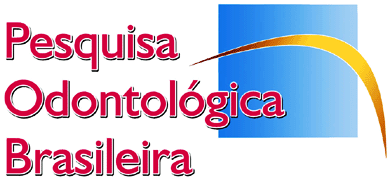Thermocycling simulates, in vitro, thermal changes that occur in the oral cavity. The aim of this study was to evaluate the influence of the number of cycles on microleakage. Class V cavities (1.5 mm deep, 3 mm in height and 3 mm in width) were prepared in bovine teeth, restored with a Single Bond/Z250 restorative system (3M/ESPE) and then divided into five groups of ten teeth each: group 1 was not thermocycled (control group), and groups 2, 3, 4 and 5 were thermocycled 500, 1,000, 2,500 and 5,000 times, respectively (5º-55º ± 2ºC, 15 s dwell time). The teeth were immersed in 0.5% basic fuchsin aqueous solution for 24 h, sectioned and the sections with the highest degree of microleakage were selected, scanned and the extent of dye penetration was measured by the ImageTool program. The results submitted to one-way ANOVA showed no significant differences between the groups (p > 0.05). The averages of microleakage values in millimeters were: group 1 (3.92); group 2 (3.13); group 3 (4.48); group 4 (4.33) and group 5 (3.42). Thus, it was concluded that there is no relation between the increase of the number of cycles and the increase in microleakage.
Dental leakage; Composite resins

